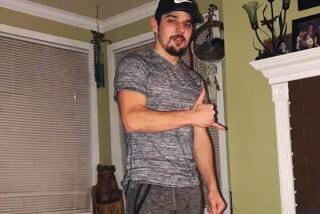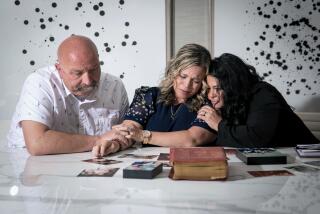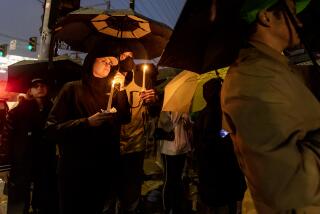Man’s Troubled Life Ends in Confrontation With Police : Shooting: Although they tried, Allan Eberhardt’s friends and family couldn’t save him.
- Share via
Plenty of people could see that Allan Eberhardt was barreling headlong toward disaster.
But no one--not the police, not neighbors, not psychologists, not family members--could figure out how to stop him.
Now, just days after Eberhardt, 23, died in a rain of bullets after a violent confrontation with harbor-area police, the futility of his death overwhelms both those who knew him and those who killed him.
Relatives do not dispute that Eberhardt was in a drug-induced craze when he armed himself with a dull, two-foot-long machete and went on an all-night tirade last Saturday in San Pedro.
After threatening a cashier and security guard with the weapon while stealing a beer from a San Pedro liquor store, Eberhardt led police on two high-speed chases and escaped both times. He later broke into an acquaintance’s home in the 2600 block of Kerckhoff Avenue, where he broke windows and chopped furniture into pieces with the machete.
When police, summoned by neighbors, ordered him from the house, he screamed at them repeatedly to kill him. Officers said they tried twice to subdue him with an electric Taser gun, but both times Eberhardt used his machete to cut the wire darts from his body.
Family members agree that Eberhardt’s behavior that night was unusually violent.
But they say witnesses have told them that he was in a stooped position with his arms behind his back when three officers fired 16 shots at him, striking him eight times.
“Maybe they had the right motive, but they used the wrong method, 180 degrees out of phase,” Eberhardt’s father, Roland, said in an interview Tuesday. “Why wasn’t Allan shot in the leg or the foot or the arm? Why was he shot in the chest? Why 16 times? . . . He was crying out for help and they went out there and they conducted an execution.”
The LAPD’s Officer Involved Shooting team is investigating the incident. Family members say they plan to hire a lawyer.
Police agree that the machete was behind Eberhardt’s back when the shooting started. But they say he was advancing on one officer in the front yard of the house, backing him toward a fence and screaming threats when police began shooting in self-defense.
“A guy with a big knife was coming at him after being told numerous times not to . . . (and the officer) was aware that there was a fence behind him that he was going to be up against if he kept backing up,” said Lt. William Hall, head of the department’s officer-involved shooting investigation team.
“The whole time (Eberhardt) is saying ‘Kill me, kill me. You’re going to have to shoot me,’ ” Hall said. “The officer he was advancing on fired in self-defense. The other two . . . fired because they perceived the first officer to be in danger.”
Officers are trained to shoot at the largest part of a suspect’s body if they believe they or someone else is in mortal danger, said Capt. Joseph De Ladurantey, commanding officer of the Harbor Division. Arms and legs are too hard to hit with any accuracy, he said.
“You shoot to stop, essentially, more than you shoot to do anything else,” he said.
But why so many times? Friends and family want to know.
“Adrenalin,” De Ladurantey said. “They had no idea that they fired as often as they did . . . and the whole thing happened within the matter of a moment, essentially simultaneously. Each was not aware that the others were firing.”
There is one thing upon which the police and Eberhardt’s family and friends agree: They wish that, somehow, there had been more time to talk things out.
A placid, trusting young man who told friends he found his greatest peace surfing the long waves off the Palos Verdes Peninsula, Eberhardt’s troubles began in adolescence.
He dropped out of San Pedro High School a few months before his scheduled 1985 graduation and began doing dry-wall work and remodeling his family’s Point Fermin home, where numerous surfing photographs of him are displayed.
Friends and co-workers knew him as “a good Christian,” who talked a great deal about spiritual growth and gave his father gifts of wooden plaques bearing Biblical passages. But Eberhardt was deeply disturbed after an elder brother was murdered by a robber five years ago at the age of 23.
Although Eberhardt had smoked marijuana off and on for a number of years, relatives said, he had not experimented with any stronger narcotics.
His final downward spiral began about six weeks ago, when an acquaintance introduced him to cocaine, neighbors and family said. Soon Eberhardt could not get enough of it.
He was erratic and aggressive when he was high, babbling about people who were out to get him. On several occasions, he told his father to call police to protect him from the strangers who wanted to kill him.
Two weeks ago, after Eberhardt took a friend’s advice that heroin would help him come down from a severe cocaine high, paramedics took him to Harbor-UCLA Medical Center for a 72-hour psychiatric evaluation, family members said. Fearing he would lose his job as an equipment operator at a Long Beach waste-to-energy power plant, Eberhardt requested that he be released a day early so he could report to work. The hospital consented after family members agreed he could come home.
A few days after his release, Eberhardt’s father left for a Yosemite vacation, believing his son “had the victory” on his drug abuse.
“He put his arms around me and he hugged me and he said, ‘Dad, I love you. I’m going to be OK,’ ” the senior Eberhardt recalled. “He said he wanted me to have a good vacation . . . I felt so good leaving on such a positive note.”
Neighbors said Eberhardt relapsed shortly after his father left.
Alarmed to find rust inside the engine of his brand-new Ford Probe, a car he had saved for years to buy, Eberhardt told neighbors he believed a salesman had deliberately sold him a used car.
He went to Coletto Ford in Harbor City in a rage last Thursday and demanded to see the general manager, said sales manager Bruce Bartemio.
“He was swearing and carrying on and saying he was going to rip (the manager’s) eyes out,” Bartemio said. “I finally got him outside to try to calm him down and just talk to him, but it was impossible. He was screaming and saying he was going to cut everybody’s arms off.”
After a few minutes, Eberhardt climbed into his car and drove away before police arrived.
“They said they would check it out, because he said he was going home to get a gun, but we never heard anything more . . . until we heard what happened to him Saturday,” Bartemio said.
A neighbor, Laura Martin, also had called police last week to say she believed Eberhardt was in danger of hurting himself or someone else. She said Eberhardt, usually a calm, quiet man, had set off fireworks at 5:30 one morning, aiming rockets and noisemakers at neighboring houses.
“He was screaming at people, ‘Call the police, if you know what’s good for you. Call the police,’ ” Martin said. “He said he was going to kill someone if they didn’t call police.”
The following day, Eberhardt stumbled up to Martin’s front door, mumbling that he had taken too many drugs and was going to die.
She told the paramedics who responded to her call that Eberhardt was emotionally disturbed and needed psychiatric help, but they took him to a facility without a psychiatric ward.
Ninety minutes later, an apologetic Eberhardt came to her door to return a towel she had loaned him. He thanked her and told her not to worry.
On Friday, less than 24 hours before Eberhardt died, Martin stopped by his house to check on his well-being. She found him curled up under several blankets on a couch with food, trash and broken pottery strewn around him.
Mumbling nearly incoherently, he confessed that he had not been eating, but said he would be all right, Martin said. It was the last time she saw him.
“I thought something bad was going to happen to him and I tried to make the system work for him, but I just couldn’t find a way,” Martin said. “You could see this kid was in a lot of pain. He wanted out, he wanted to die, but he didn’t want to do it himself.”
More to Read
Sign up for Essential California
The most important California stories and recommendations in your inbox every morning.
You may occasionally receive promotional content from the Los Angeles Times.













